OLIVOMUNDO, innovating to grow
On 15 December, a visit was made to the company to learn about the COMPETE 2030 project, which involved a total cost of €15 million and support of around €6 million.
In the latest edition of "Boas Conversas", COMPETE 2030's internal event, we welcomed Grupo Celeste to talk to us about “NutriSafeLab”, a project co-funded by COMPETE 2020.
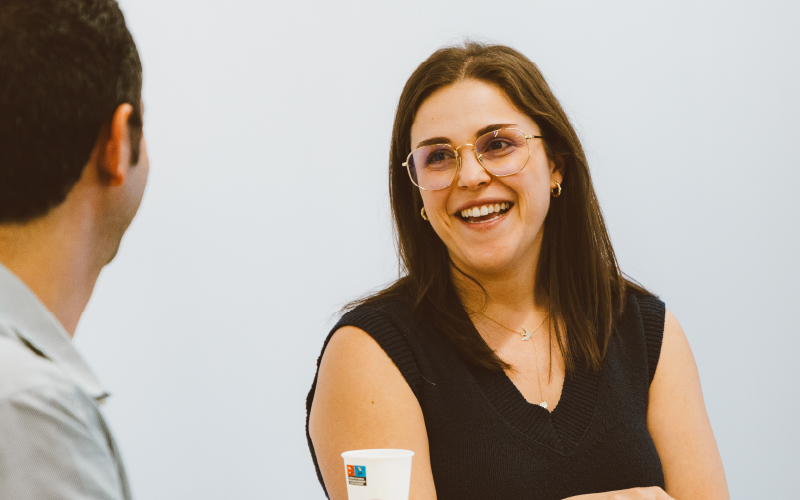
In the latest edition of “Boas Conversas”, COMPETE 2030’s internal event, we welcomed Grupo Celeste to talk to us about “NutriSafeLab”, a project co-funded by COMPETE 2020.
Luís Castilho, Member of the COMPETE 2030 Steering Committee, opened the session by emphasising the importance of projects supported by the European Union’s Cohesion Policy for the growth of Portuguese innovation in various sectors.
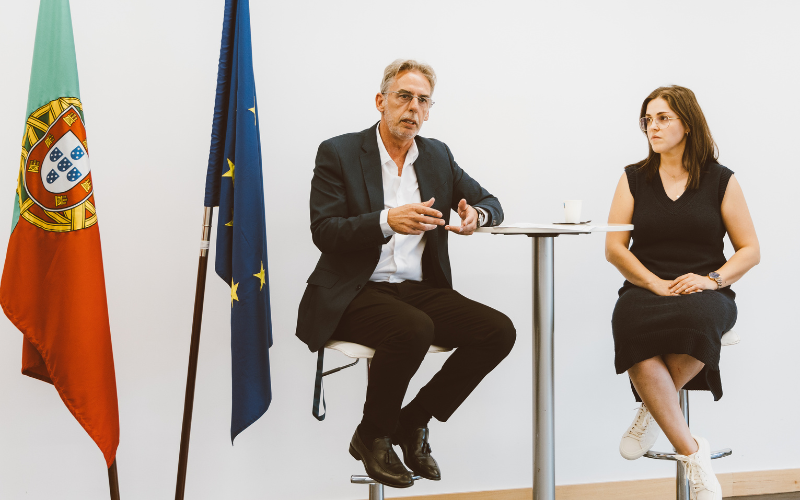
The guest of this initiative was Catarina Rocha, Research and Development Technician at the Celeste Group, who presented the company and the NutriSafeLab project.
In an informal chat, moderated by Lourenço Ovídio, from the Communications Unit, Catarina Rocha mentioned the challenges before the project, the company’s commitment to innovation and the investment in sustainability as an unavoidable theme for all sectors.
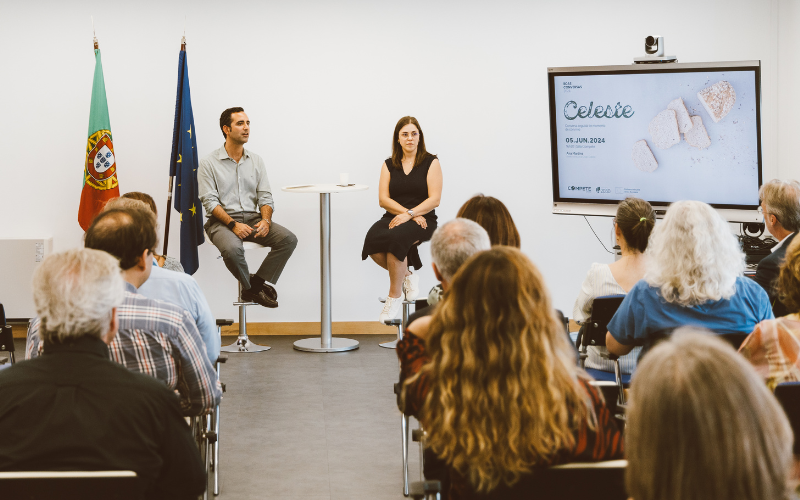
Joana Castro, Head of Quality and Food Safety, was also present, highlighting the strategy of the Group, which has more than 50 years of history, and how this project has combined tradition with innovation to generate added value to existing products.
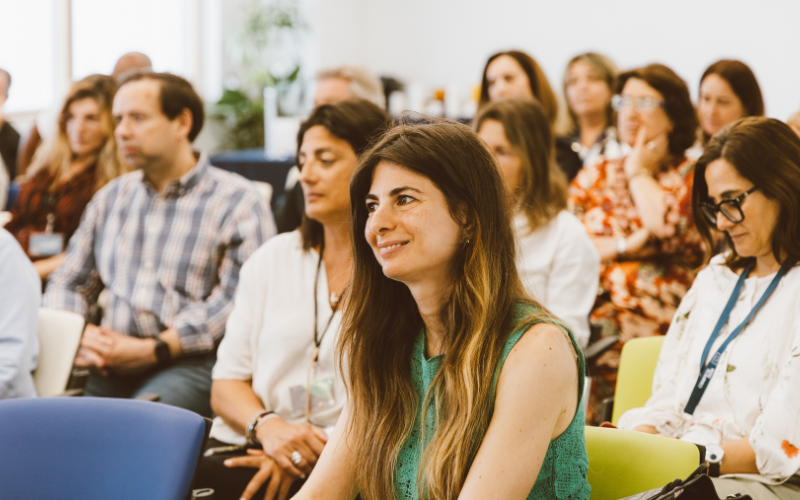
The demand for natural, healthier products with less sugar and calories, no additives and functional ingredients that provide health benefits is growing.
NutriSafeLab set out to reinvent the bakery and pastry industry in Portugal, focusing on the manufacture of new food options with lower salt content, colourings and half the fat, reinforced with higher fibre content, while also increasing their shelf life for consumption.
“The project began with the need to keep up with the more demanding trends of today’s more informed consumer. The main objective was to improve the nutritional and functional profile of the Celeste Group’s pastry and bakery products by developing a line of healthy products, replacing white sugar with dates, for example, without changing the original colour and texture of the products”, said Catarina Rocha.
“The collaboration with the School of Biotechnology at the Portuguese Catholic University was very positive“
The Celeste Group, together with the School of Biotechnology of the Portuguese Catholic University (UCP), has joined forces to develop new products in order to position the company in an innovative segment, promoting its competitiveness in the national and international sector.
“The research team from the Centre for Biotechnology and Fine Chemistry at UCP’s School of Biotechnology devised new recipes for brioche and puff pastry with the aim of ‘reducing the significant number of synthetic additives in the products and developing a new “Clean Label” line, in which synthetic preservatives, flavours and colourings have been replaced by natural alternatives”, also shared Catarina Rocha.
COMPETE 2020 supported this project, which helped advance scientific research and modernize the food industry in Portugal. It was possible to invest in and implement a new R&D laboratory and two new product lines “Clean Label” and “Healthyfat”.
NutriSafeLab was an important invocation for this Portuguese company to increase its capacity to respond to a demanding market, broadening the diversity of its spaces and making them more competitive with a strong focus on product marketing.
The company already has three factories, ten shops and a supermarket, as well as a factory in Luxembourg, increasing its proximity to the Portuguese community abroad and the local public.
They now intend to start the 2nd phase of the project with a vegan pastel de nata with 55 per cent less fat, for all those who cannot consume dairy products, and to expand the brioche and puff pastry internationally.
Celeste Group invests in environmental sustainability
In terms of sustainability, Catarina Rocha pointed out that ‘the [Celeste] Group has joined the Guimarães Climate Pact, which is being signed today [5th June, World Environment Day]’. This is an initiative of the Municipality of Guimarães that aims to involve citizens, companies and institutions in collaborative action to decarbonize the territory, with a view to climate neutrality by 2030.
In this area, “a major investment is being made in the company with the installation of photovoltaic panels and LED lights to reduce energy consumption and reduce the carbon footprint”.
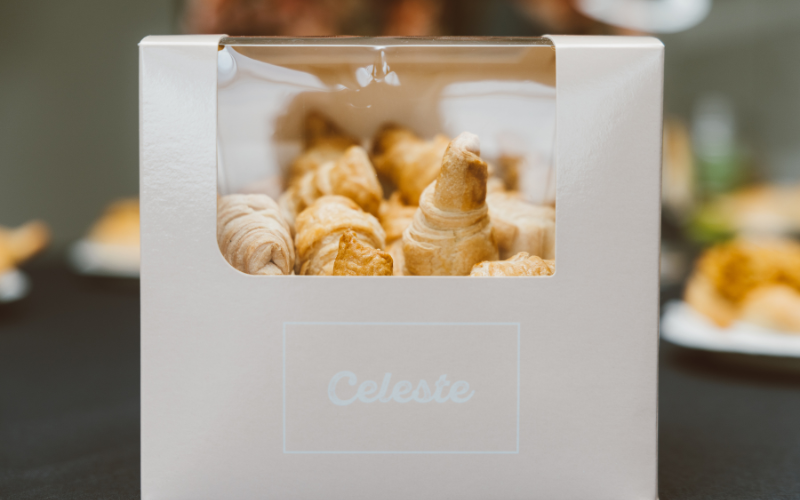
Packaging is another element that is being worked on with more sustainable materials, as well as the car fleet, where electric vehicles are increasingly gaining ground, and ‘the machinery’ which has been renovated with ‘more energy-efficient equipment, reducing production costs’.
As for the social component, there is a concern to combat food waste, establishing contacts with partners such as Refood, where surplus food is distributed to the families and institutions that need it most.
With an eligible investment of 724,000 euros, ‘NutriSafeLab’ represented a significant milestone in the industry to position Grupo Celeste as a leader in the segment, both in the national and international markets.
Catarina Rocha concluded that “Grupo Celeste has made a big investment in innovation and sustainability and can be a good example of how small companies can become big by taking advantage of support for Research & Development”.
After the talk, everyone present had the opportunity to taste some of the products that have already been developed with reduced fat in the puff pastry, such as the croissant from the HealthyFat line, the Pães de Deus and the Bico de Pato, which have had their additives reduced and artificial colourings replaced with natural ingredients such as turmeric to give the food its natural colour.
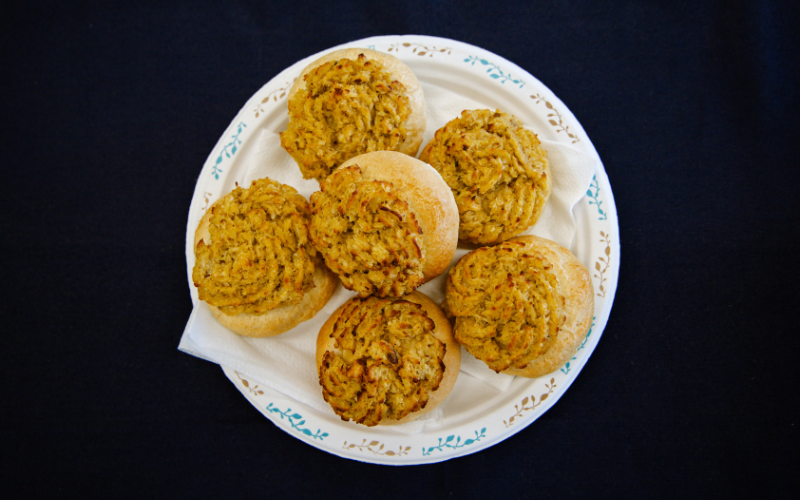
The project was co-financed by COMPETE 2020 within the scope of the Incentive Systems for Research and Technological Development in Co-promotion, involving an investment of 724 thousand euros, which resulted in an ERDF incentive of 482 thousand euros.
05 March 2026